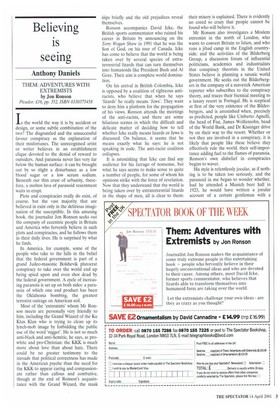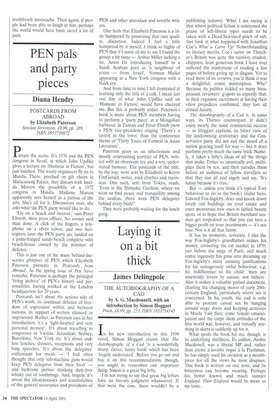Believing is seeing
Anthony Daniels
THEM: ADVENTURES WITH EXTREMISTS by Jon Ronson Picador, 176, pp. 352, ISBN 0330375458 Is the world the way it is by accident or design, or some subtle combination of the two? The disgruntled and the unsuccessful favour conspiracy as the explanation of their misfortunes. The unrecognised artist or writer believes in an establishment clique devoted to the denial of reward to outsiders. And paranoia never lies very far below the human surface: it can be brought out by so slight a disturbance as a low blood sugar or a low serum sodium. Beneath our thin crust of urbanity, therefore, a molten lava of paranoid resentment waits to erupt.
Plots and conspiracies really do exist, of course, but the vast majority that are believed in exist only in the delirious imagination of the susceptible. In this amusing book, the journalist Jon Ronson seeks out the company of eccentric people in Britain and America who fervently believe in such plots and conspiracies, and he follows them in their daily lives. He is surprised by what he finds.
In America, for example, some of the people who take to the hills in the belief that the federal government is part of a grand Judeo-masonic Bolshevik plutocrat conspiracy to take over the world end up being spied upon and even shot dead by the federal government. A cycle of increasing paranoia is set up on both sides: a paranoia of which one end product has been the Oklahoma bombing, the greatest terrorist outrage on American soil.
Most of the 'extremists' whom Mr Ronson meets are personally very friendly to him, including the Grand Wizard of the Ku Klux Klan who is trying to clean up its lynch-mob image by forbidding the public use of the word 'nigger'. He is not so much anti-black and anti-Semitic, he says, as prowhite and pro-Christian: the KKK is much more about love than about hate. There could be no greater testimony to the inroads that political correctness has made in the American psyche than the need for the KKK to appear caring and compassionate rather than callous and combative, though at the end of Ronson's acquaintance with the Grand Wizard, the mask slips briefly and the old prejudices reveal themselves.
Ronson accompanies David Icke, the British sports commentator who ruined his career in Britain by announcing on the Teny Wogan Show in 1991 that he was the Son of God, on his tour of Canada. Icke has come to believe that the world is being taken over by several species of extraterrestrial lizards that can turn themselves into humanoids like President Bush and Al Gore. Their aim is complete world domination.
On his arrival in British Colombia, Icke is opposed by a coalition of righteous antiracists, who believe that when he says 'lizards' he really means 'Jews'. They want to deny him a platform for the propagation of his views. Ronson attends the meetings of the anti-racists, and there are some hilarious scenes in which the difficult and delicate matter of deciding how to tell whether Icke really means lizards or Jews is discussed. On balance, it seems that he means exactly what he says: he is not speaking in code. The anti-racist coalition collapses.
It is astonishing that Icke can find any audience for his farrago of nonsense, but what he says seems to make sense to quite a number of people, for some of whom his opinions strike with the force of revelation. Now that they understand that the world is being taken over by extraterrestrial lizards in the shape of men, all is clear to them: their misery is explained. There is evidently no creed so crazy that people cannot be found who will believe it.
Mr Ronson also investigates a Moslem extremist in the north of London, who wants to convert Britain to Islam, and who runs a jihad camp in the English countryside; and the activities of the Bilderberg Group, a discussion forum of influential politicians, academics and industrialists that conspiracy theorists in the United States believe is planning a satanic world government. He seeks out the Bilderbergers in the company of a maverick American reporter who subscribes to the conspiracy theory, and traces their biennial meeting to a luxury resort in Portugal. He is sceptical at first of the very existence of the Bilderbergers, and is astonished when, precisely as predicted, people like Umberto Agnelli, the head of Fiat, James Wolfensohn, head of the World Bank, and Dr Kissinger drive by on their way to the resort. Whether or not they are involved in a conspiracy, it is likely that people like these believe they effectively rule the world, their self-importance adding fuel to the flames of paranoia. Ronson's own disbelief in conspiracies begins to waver.
His style is relentlessly jocular, as if nothing is to be taken too seriously, and the paranoid in me began to wonder whether, had he attended a Munich beer hall in 1923, he would have written a jocular account of a certain gentleman with a
toothbrush moustache. Then again, if people had been able to laugh at him, perhaps the world would have been saved a lot of pain.



























































 Previous page
Previous page